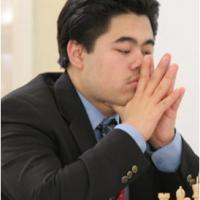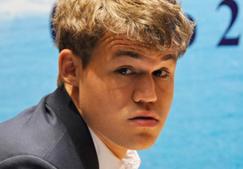
Nakamura! SuperStar Pressure Part 2
Recently, Ben Finegold an American who became a grandmaster at age forty said that he wants to win every chess game equally. When not quite getting what he was saying, Ben clarified to me by giving the example from the King's Island Open where the win in the last game would make me a sole winner of the tournament. He made a point by saying that I wanted to win that game more than the other games in the tournament. For him it is different: he does not differentiate between the games of super importance and the other games. Every game is of great importance to him. In numerous tournaments that he played in his native state of Michigan, hardly anyone could draw him. He was far higher rated than the field, but playing lower-rated players one can get careless and lose concentration and be punished heavily. Ben’s results are usually consistent and there are not many surprises. I am not sure if one can systematically develop such an approach to the game or it is something inherent specifically to Ben Finegold. I think that by taking this approach Ben cannot choke under the heavy weight of an important game. If I had treated the last game of the King's Island tournament as equally important as any other game, maybe I would have had a better result there; at least I would not have tried to win at all cost.
Playing chess superstar Hikaru Nakamura in St. Louis in the third round of a two-day tournament did not make me feel that I should rise to a special occasion, that I should use a chance to bring the best of my game; in other words, I did not think of it as a critical game. This was partially due to the fact that the game was played in the third round of the day, I had just finished a long nerve-wracking Dragon on the Black side, where I sacrificed a rook positionally for three pawns and led the game to victory. It was a long day, there was an option to go to dinner with an organizer and take a bye or play the third round. Knowing the generosity of Rex Sinquefield and the fantastic dinners he takes the players out to, it seemed a no-brainer to take a half-point bye in the third round and enjoy the evening. But these days I am a PhD student and time for a chess tournament is rather scarce, so I cannot miss an opportunity to play chess, especially when at a tournament already. And the decision played out to be a good one- I have never played Hikaru before and suspect that I will not play him again anytime soon, so it could have been a once in a life-time opportunity.
I remember during the game my friend Irina Krush came up to me and asked if I was excited to have this great opportunity. I remember answering that this is a great opportunity to finish the game quickly and still make it to Rex’s dinner. I was rather objective, as many of Hikaru’s games in the tournaments finished in the opening- he just dispatched the players. My point is that I played this game very well as a result of being in good form: it was not a result of rising up to a great opportunity. I cannot do that, I usually choke when there is an important game at stake. My results would be much better if I took Ben’s approach. Also, there was no superstar effect present here either. For a superstar effect to take place there should be two competitors of an approximately similar chess level: there are about 400 rating points between myself and Hikaru. Let us proceed to the game.
Here I took some time to come up with a plan. Consistency was never my quality but I am working on it. By playing Rb1 white threatened to push pawns on the queenside and grab some space. Black prevents it by playing a5, and in case of a3-b4 will have an open file for the rook a8. I am still not too convinced by the a5 plan, since as in the game the b6 square is terminally weak and white can use that. The next stage of the game is for both sides to finish their development. I am continuing with the a3-b4 plan.
Here, the development phase of the game ended and new plans have to be constructed. My last move took me about 20 minutes to come up with. The reasoning was that the bishop on c1 is perfectly placed- I don’t know yet where it needs to be: b2 or f4. Qb3, Rb1, Nc3 are all working. Relieving pressure on the queenside does not make any sense, since it will make black’s life easier, by playing Rb8. The only piece that is not working yet is Rf1. Usually, in the Dutch we want to keep it on f1 to protect the f2 square but in this case, black has pieces concentrated on the queenside, thus no attack is yet possible. Here, Nakamura took some time thinking too, I guess he figured it was the right moment for decisive actions. The next stage of the game is infused with intermediate moves and tactics.
We are done with tactical complications- the position has a static character. I was pleased with my position. The b6 pawn is a strength for white – it gives the important penetration square of c7. Bg2 and Bg7 are equally bad. Black might attack my king at some point but I thought there are not enough attacking pieces. My plan is to get the c-file after Bf4 (it has to be on f4 to control b8-c7 squares). Black has to close the file by putting the bishop on c6. Then, improve the position more and threaten R:c6 with b7-b8. Black has to stay passive.
The end of the game was particularly exciting. I had two minutes left but we had a 5 second increment. After Q:f2 Hikaru started to play with the speed of 10 moves per second, it was really intimidating. I knew I was playing the best blitz player in the world but the game felt surreal. I remember thinking "where did those 5 seconds of increment go?" I would make a move and be left with the same or less amount of time. People said after the game that I could have played the final position for a win, ok but not with 5 seconds on the clock and not against a blitz god.
I heard from other people that chess players make unbelievably stupid mistakes against Hikaru and this made me think of him having a superstar effect. I took two US Championships that he won and looked at the results of the five highest rated players of the tournament (not including Nakamura). My assumption is that the superstar effect will translate on those that are about his rating, making them perform below their usual strength. The data from San Diego US Championship of 2004 is not useful because there were two sections playing separately, thus Nakamura didn’t play the players not in his section. The data from last year's US Ch. in St. Louis rather surprised me. He drew four of the highest rated players and won against only one. Most of them performed above their strength. There is no way to make any definite conclusions taking only one/two data sets. My conclusion is that at least in the last US Championship there was no superstar effect that Hikaru generated on the five high rated players. They did not magically collapsed or underperform, there was no huge points advantage between the first and the second place. The next time I hear that Hikaru wins tournaments because of the superstar effect he exerts on his opponents, I would think twice before coming to conclusions. All I know from the experience of playing him: you do not want to be in time trouble against Hikaru. Under this circumstance he will collect half points from bad positions and full points from equal positions because he is faster-thinking and faster-moving than any chess player in the world. There is no magic involved.
Data from US Chess Championship 2009
|
|
|
Rating |
Points Scored |
vs. Naka |
Performance |
|
1 |
Nakamura |
2701 |
7 |
- |
|
|
2 |
Kamsky |
2720 |
6 |
0.5 |
same |
|
3 |
Onischuk |
2684 |
6.5 |
0.5 |
above |
|
4 |
Shulman |
2632 |
5 |
0.5 |
above |
|
5 |
Akobian |
2612 |
6 |
0 |
above |
|
6 |
Ehlvest |
2606 |
4.5 |
0.5 |
below |



